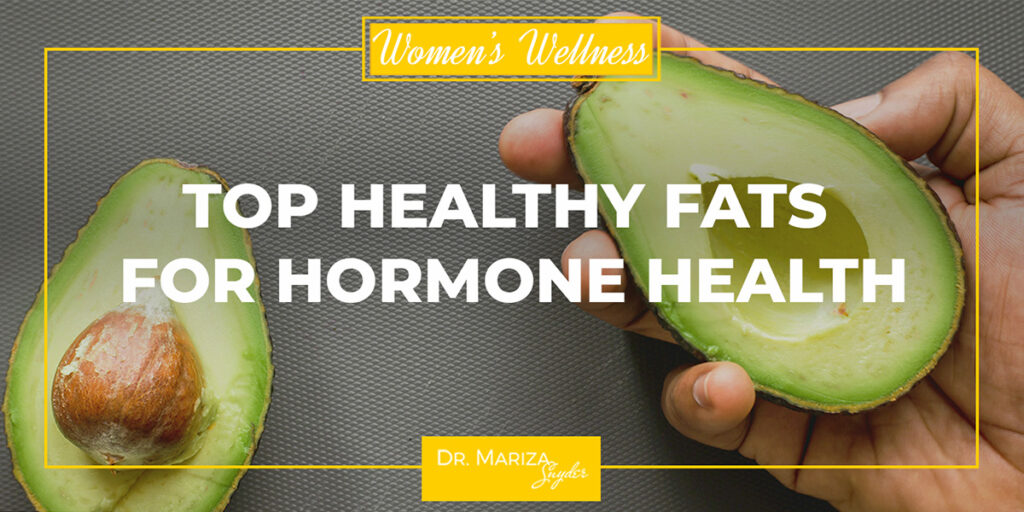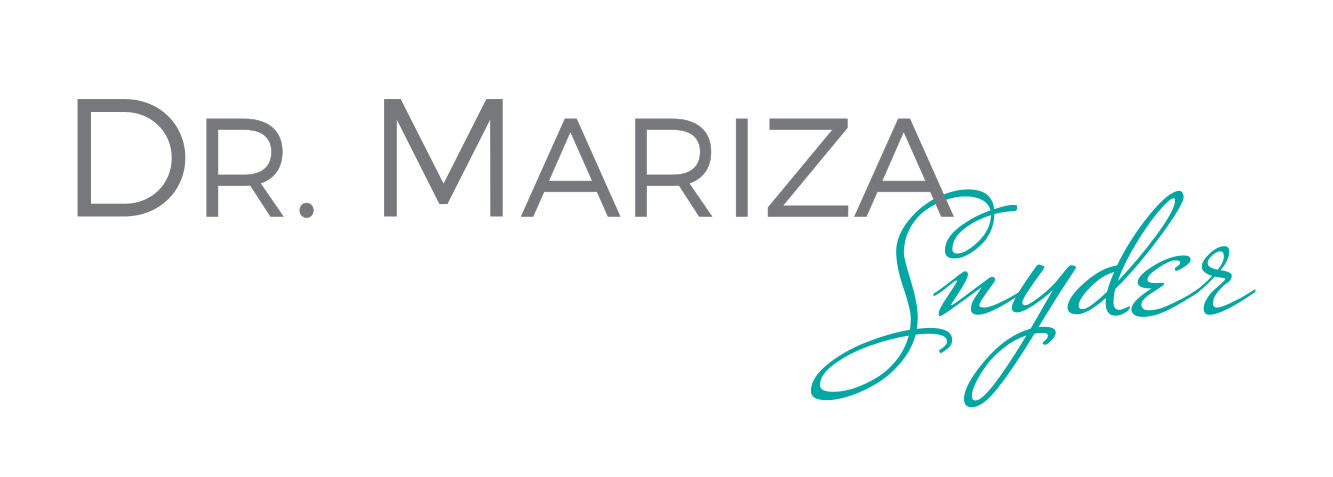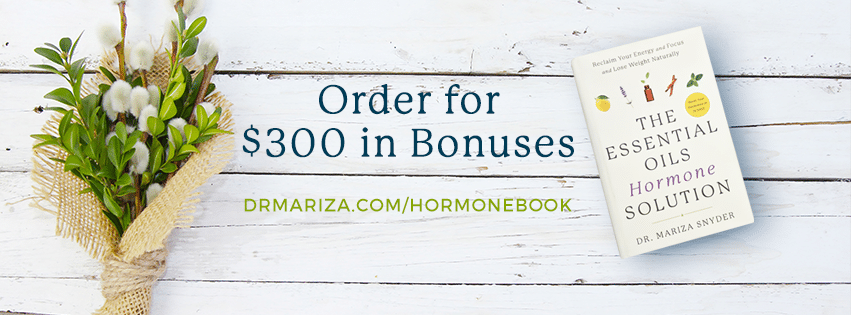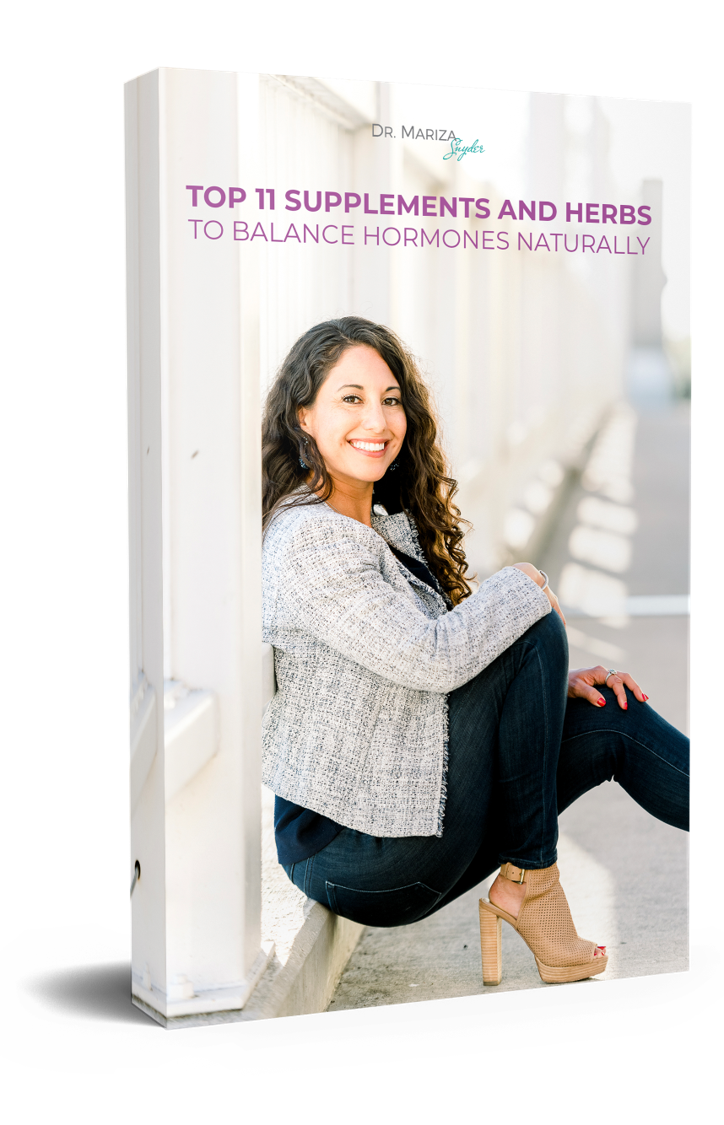
Fats carried such a bad rap for so long that it’s easy to find yourself still thinking they should be limited or completely avoided. But not all fats will make you fat or lead to clogged arteries, heart issues, or weight gain.
On the contrary, healthy fats are vital for your body to function at its best. They keep you energized, help you think clearly, enable you to digest and absorb necessary vitamins, and maintain your cell membranes. And, yes! They help to keep those hormones balanced! (1)
Demystifying the Kinds of Fats
Women who are afraid of eating fats may find that their hormones are out of whack. Fats actually give your body the building blocks it needs to make the hormones that govern all of your systems. But, there are so many different kinds of fats that it can be overwhelming to try to weed through it all.
Here are a few of the key types of fats and the roles they play in your hormone health:
- Omega-3s: These fatty acids pack a punch for your health. Not only do they make up most of every cell membrane in your body, Omega-3s are vital to hormone production, keeping inflammation at bay, and easing symptoms associated with pregnancy (preeclampsia, premature birth, and postpartum depression, for example) and menopause. (2) You can get your fill of omega-3s by making sure you are eating seafood and nuts on a regular basis.
- Saturated Fats: These fats are recognizable for being mostly solid at room temperature, with butter and coconut oil being the most common ones. Saturated fats are the easiest for your body to break down (bioavailable), so they are helpful in moderation for providing the resources your body needs to manufacture all of your hormones. (3)
- Unsaturated Fats: These are the most common fats that you encounter in your day-to-day life. Mostly liquids at room temperature, unsaturated fats are common cooking oils like olive and flaxseed oils, as well as being found in foods like avocados and nuts. These oils are helpful in maintaining a balance of good and bad cholesterol in your body, as well as giving your brain a boost. (4)
- Cholesterol: This is a scary word that your doctor has probably warned you about, but not all cholesterol is created equal. Your body produces cholesterol in addition to what you get from the foods you eat, and it is a key ingredient for making and regulating your sex hormones. (5) The bad cholesterol is what builds up in your blood after your body has used up what it needs. That’s why it is so important to eat the right fats in moderation: healthy fats help to reduce bad cholesterol levels and manage overall inflammation because your body is able to put them to use and not have as much waste. (6) You also need to eat fat to burn fat. Cholesterol is a key player in making bile acids in your liver that break down the fat you eat. (7)
- Triglycerides: Your body takes the fat that you eat and turns it into triglycerides to store it for later use. While they are necessary for energy, if you have too many, they can lead to thyroid, kidney, or liver problems along with PCOS. (8) Eating healthy fats (especially omega-3s) can help keep your triglyceride levels in check.
Digesting Fats
Eating fats throughout the day helps you feel full and balances your blood sugar levels. Your body raises insulin levels in response to eating carbs and sugars, which tells your body to stop breaking down fat and to use the sugars for energy instead. Fats don’t raise insulin levels, so your body is able to use them for energy right away. (9)
Fats also activate the hormones that make you feel full and they take longer to break down, so incorporating healthy fats into each meal will help limit the snacking that gets us in trouble. (10, 11)
Taking a digestive enzyme with your meals can also help you make sure your fats are being used efficiently. When your digestive system is under stress or your blood sugar levels get out of balance, it can really throw off your hormone homeostasis, so keeping to healthy fats that your body can use for energy is a must when planning your meals!
Vitamin Absorption
Even if you take your supplements routinely every day and eat specific foods because of their dense vitamin content, your body still needs fat to help process those nutrients! Zero fat is not the answer.
Vitamins A, D, E, and K are all carried through your system and stored in fat rather than water. Making sure to pair sources of these vitamins with healthy fats will help your body absorb and use them to get you what you need.
Vitamin deficiencies can significantly impact your body’s ability to keep a balance of its hormones, so you want to make sure you are getting all you can from the foods you eat. Try drizzling your veggies with olive oil or eating some nuts or seeds with your salad to get that dose of healthy fat!
So, how much fat should you be eating? It is important to keep a balance on your plate so it is not leaning too heavily towards fat, protein, or carbs. A good number to shoot for is 15-30 g per day of quality, healthy fats to help your body have what it needs to build your hormones and keep you going!
Some good sources of healthy fats that you should introduce to your diet in moderation are:
- Extra virgin olive oil
- Avocados or avocado oil
- Coconut oil
- Nuts
- Seeds
- Fatty fish (like salmon, sardines, tuna, or mackerel)
Need Some Recipes?
In my most recent best-selling book The Essential Oils Hormone Solution, Part 3 is dedicated to a multi-faceted approach to reset your hormones and get you back to health. Your daily fat intake is built into the recipes and meal plans, so it is a great starting point to get you eating for your hormone health!
Order The Essential Oils Hormone Solution and Get Over $300 in Bonuses
Learn how to heal hormonal chaos and revitalize the body from the inside out with the support of high-quality essential oils.
References:
- https://www.ahajournals.org/doi/10.1161/CIRCRESAHA.115.307345
- https://www.ncbi.nlm.nih.gov/pubmed/15385858
- https://drbrighten.com/all-about-fat-3-fast-fat-facts/
- https://drbrighten.com/all-about-fat-3-fast-fat-facts/
- https://www.health.harvard.edu/heart-health/how-its-made-cholesterol-production-in-your-body
- https://www.hopkinsmedicine.org/health/wellness-and-prevention/why-cholesterol-matters-for-women
- https://www.hopkinsmedicine.org/health/wellness-and-prevention/why-cholesterol-matters-for-women
- https://www.hopkinsmedicine.org/health/wellness-and-prevention/why-cholesterol-matters-for-women
- https://jjvirgin.com/eat-fat-burn-fat/
- https://academic.oup.com/ajcn/article/65/5/1410/4655465
- https://www.ncbi.nlm.nih.gov/pubmed/26178726



Thanks for the information!!